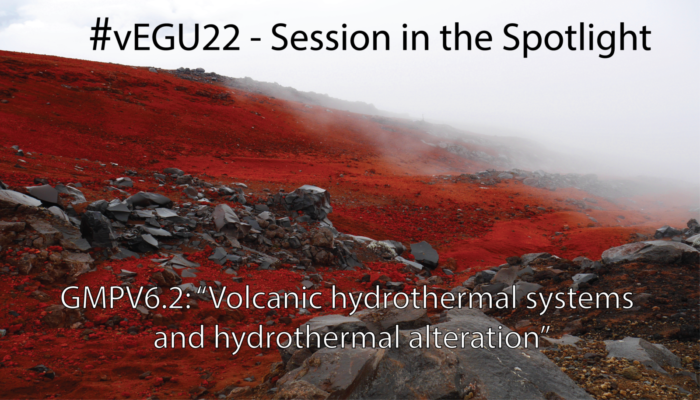
The abstract submission for the General Assembly in 2022 is open now! Our colleagues from the organization were very engaged and we are more than happy to share that the EGU22 is aimed to take place in a hybrid version! To celebrate this opportunity we will highlight some of our many GMPV sessions in the course of the next few weeks, to give everyone a broad overview of the amazing sessions EGU22 has to offer. Abstract submission is open now until 12. January 2022!
Today we present session GMPV6.2 “Volcanic hydrothermal systems and hydrothermal alteration“, which is convened by Michael Heap, Marina Rosas-Carbajal, Claire Harnett, Marlène Villeneuve, and Thomas R. Walter. The conveners say:
What’s that smell? Once you’ve recovered from the awe of standing on an active volcano, your thoughts turn to smells. Funky ones. What you’re smelling are gases formed by interactions between magmatic volatiles, meteoric fluids, and rocks within a hydrothermal cauldron that resides beneath your feet. Not only does their ubiquity speak to their importance, but hydrothermal systems at volcanic systems are known to play a key role in many volcanic processes and volcanic hazards, as well as creating minerals of economic interest and resources that can be harnessed to produce energy. In short, they’re important and understanding them is equally important.
Gases escape from a fumarole at Whakaari volcano (New Zealand). Video Credit: Mike Heap.
The surge in peer-reviewed publications that seek to better understand volcanic hydrothermal systems and hydrothermal alteration is a testament to how our communities now interpret their importance. Although great works on volcanic hydrothermal systems exist, and have existed for decades now, perhaps this research avenue has remained somewhat in the shadows because of the need for coordinated, collaborative ventures. Indeed, understanding hydrothermal systems requires a vast array of very different scientists with very different skillsets, and information is typically buried in the literature of different disciplines (e.g. volcanology and ore research). Our session, “GMPV6.2 Volcanic hydrothermal systems and hydrothermal alteration”, hopes to capitalise on this wave of research and, hopefully, prompt a lot more. Our convening team consists of a rock-squasher, that’s me (Mike Heap), a hydrologist/geophysicist and early-career researcher (Marina Rosas-Carbajal), a volcano modeller and early-career researcher (Claire Harnett), a geotechnical engineer and rock-squasher (Marlène Villeneuve), and a “remote-sensor” (not sure that’s a word; Thomas Walter). We hope to discuss all things hydrothermal in our session, and so please submit your experimental, laboratory, modelling, and/or fieldwork studies! Let’s hope for a great, and inspiring, discussion! It goes without saying that we hope to have a diverse session in terms of both speakers and audience.
You can submit your abstract now here 👈
